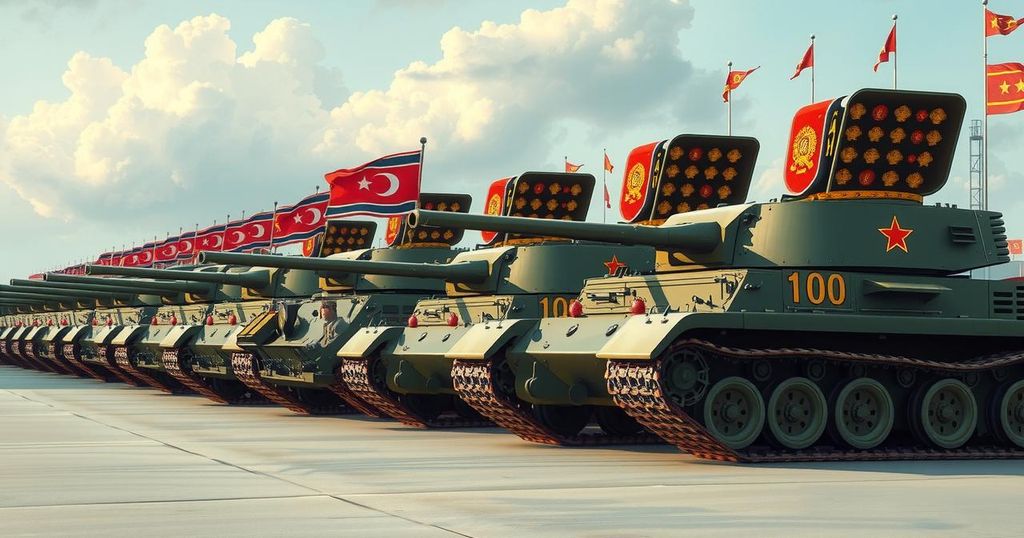Kim Jong-un to Skip Russia’s Victory Day, Signals Ongoing Military Focus

North Korean leader Kim Jong-un will skip Russia’s Victory Day on May 9, despite growing military ties. He continues military inspections at home, supporting Russia’s wartime efforts, while a Russian aide confirmed North Korea’s lower-level representation. This absence is notable as no North Korean leader has attended such parades ever before.
In a surprising turn of events, North Korean leader Kim Jong-un and his troops will be absent from Russia’s Victory Day celebrations on May 9. This was confirmed by the Kremlin amidst speculation regarding Kim’s potential appearance in Moscow alongside global leaders. Many observers point out that this development comes despite North Korea’s growing military ties with Russia, particularly as Kim continues to conduct “field guidance” at armament facilities back home.
Russian presidential aide Yury Ushakov stated in a briefing that North Korea would have representation at the ambassadorial level, as reported by TASS, a state-run news outlet. Interestingly, Ushakov did not dismiss the possibility of Kim and Russian President Vladimir Putin meeting in the future, hinting at an “interesting” upcoming event, though specifics remained unannounced.
Ushakov confirmed that a total of 29 foreign leaders are set to participate in the Victory Day Parade, including leaders from Belarus, Brazil, China, and several other countries. It is worth noting that historically, no North Korean leader has participated in this parade, nor has the regime sent troops to foreign military parades.
The North did send a delegation in 2015, led by Kim Yong-nam, president of North Korea’s rubber-stamp parliament, to mark the 70th anniversary, but Kim Jong-un has never attended a multilateral event. His father’s legacy, likewise, did not involve participation in such gatherings, even as Kim Il-sung, the country’s founder, attended similar events in the past.
Anticipation had begun to build around Kim’s attendance following a public acknowledgment from both Putin and North Korean media regarding the deployment and casualties of North Korean forces in Ukraine. This marked a significant admission but did not influence Kim’s decision to skip the parade. In fact, Ushakov reaffirmed that North Korean troops would not be taking part, emphasizing the inclusion of 13 other nations instead.
Even with the absence from the Russian festivities, Kim remains focused on military preparations at home. Reports indicate he has been busy inspecting arms manufacturing plants, aimed at bolstering military support for Moscow’s efforts in Ukraine. North Korean state media on Wednesday revealed that Kim inspected production facilities for shells and machine parts, albeit without specifying when these visits occurred.
Lim Eul-chul, a professor at Kyungnam University, interprets Kim’s factory visits as essential for reinforcing logistical support for future military operations and arms supplies, particularly linked to Russia’s demands in the conflict. He stressed the crucial strategic importance of ramping up artillery and machine manufacturing in response to military needs.
This connection highlights North Korea’s intent to provide artillery shell aid to Russia and to deepen military cooperation. Lim argues that Kim’s focus on assessing production capabilities indicates a preparation for future technological exchanges and partnerships with Russia.
In another development over the weekend, state media showcased Kim’s oversight at a “major tank factory,” again without elaborating on details such as the factory’s name or the timing of the visits. Hong Min, a senior researcher at the Korea Institute for National Unification, commented on the new M2024 tank introduced during these inspections. He suggested this model was an enhancement of the earlier M2020, designed to incorporate lessons learned from contemporary combat, particularly in Ukraine.
Hong noted that the increased public visibility of tanks aligns with a larger strategy of demonstrating combat readiness and emphasizing their role in modern warfare, whose lessons are likely to shape North Korea’s military outlook moving forward.
In summary, Kim Jong-un’s absence from Russia’s Victory Day celebrations underscores the ongoing complexities of North Korea’s foreign relations. While his leadership continues to signal military support for Russia, his absence from the parade and the focus on enhancing domestic military production highlight a dual strategy of reinforcing ties with Moscow while prioritizing internal military readiness. The nuanced developments could suggest both nations are gearing up for further collaboration, but Kim’s decision to avoid public engagement raises questions about the future of their alignment.
Original Source: asianews.network







